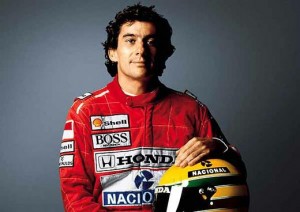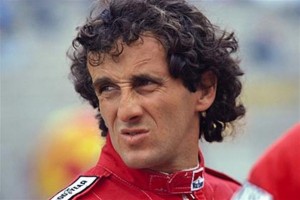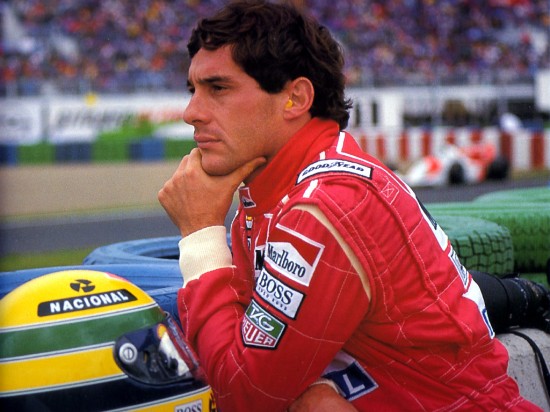Film Review: “Senna” — A Documentary where Raw Sport and Raw Talent Meet
Narrative holes and esoteric tendencies aside, SENNA is remarkable for its feat of compiling what must have been hundreds if not thousands of hours of Formula One footage. The film is surprisingly cinematic and has a vintage, if not sometimes grainy, appearance.
Senna. Directed by Asif Kapadia. At Cambridge’s Kendall Square Cinema and other cinemas throughout New England.
By Maraithe Thomas
Ayrton Senna is many things: a soft-spoken, honest, passionate man and also one of the greatest Formula One drivers of all time. He achieved the status of national hero in his home country, competed in a stormy, public rivalry, and had a personality with a charisma to burn. In other words, he makes the perfect subject for a documentary.
But Senna, a new film about the racing legend, is not perfect. The film offers an adoring look at the Brazilian racer’s career, examining it almost exclusively as it was lived on the racetrack. Save for a few shots of him relaxing on a boat in Brazil, the movie sticks to Formula One tracks and television interviews. It’s because of this that the film has that constant, pre-race air of anticipation, which, by the end of the film, feels especially fitting: the adrenaline and the sport really were Senna’s life passion. But because of the film’s narrow focus, those not seriously up on Formula One racing will feel left out.
The movie’s narrative conflict centers on the vitriolic rivalry between Senna and French racer Alain Prost. They both raced on the McLaren-Honda team and for years, though they hated each other, they were each other’s only real competition on the racetrack. The rivalry came to a head at the 1989 Japanese Grand Prix, which decided which of the two was to win the world championship that year. Even though Senna “won” the race, a controversial crash resulted in a decision to declare Prost the winner (and disqualify Senna), bringing their turbulent relationship to a breaking point: Prost left McLaren for Ferrari.
The same race the following year was also decided by a crash, but that time, Senna reigned victorious. As the two moved between teams, Prost retired in 1993 rather than face another year as Senna’s teammate, this time at Williams-Renault.
And even though Prost is painted as the villain in the film, it’s hard to imagine him not being a villain in real life. The film leans towards Senna in terms of bias, naturally (as we hear far more from him than Prost), but the movie makes some bold statements about Prost’s personality that are hard to refute (he is often shown egging Senna on to argue during interviews). Negative implications are also made about the president of the Federation Internationale de Sport Automobile, who made the decision to disqualify Senna at Japan in favor of Prost, his countryman.
On the subject of the decision to disqualify Senna, the film, while a fun, beautiful-looking examination of Senna’s career, is rife with references and situations abstruse to those without primer knowledge of Formula One. We get that Senna was disqualified, but the reasons why are not obvious. Because Senna and the sport in which he competed are not nearly as well known here (now or then) as it is in South America and Asia, the majority of Americans would not get the racing terminology. The film also fails to examine the racing world at large, choosing instead to focus on Senna alone, which is fine if you already know about F1, but if you don’t, a look at Senna is all you’re going to get. However, because it’s non-fiction, a post-viewing Google search for some of the events and terms (chicane? pole position?) will illuminate, at least for the sedulous viewer, some of what the film leaves out.
The film is filled with wonderful close-ups of Senna in moments of deep thought (the filmmakers couldn’t have shot this film better if they were shooting it today. The old Formula One footage really is impressive). His character makes the film fun—he’s a young, famous, race car driver with a great sense of humor. But in these more pensive moments, you can’t help but empathize with Senna, who tries to shy away from Prost’s attempts to dramatize their rivalry. He was pained by the fact that racing and the racing industry was fraught with politics. At the end of his career, Senna was tormented and conflicted by the introduction of computerized race cars. The film’s final scene is an interview done less than a year before his death in 1994, where he talks about the happiest time of his life: kart racing in the late 70s. “That was real racing,” he says of his raw, bare-bones beginning.
Narrative holes and esoteric tendencies aside, Senna is remarkable for its feat of compiling what must have been hundreds if not thousands of hours of Formula One footage. There was no new video incorporated into the film; commentary by Prost and Senna’s family is done as a voice-over so the speakers can be identified only through the viewer’s deduction. (i.e., lines such as “He never wanted to beat me. He wanted to humiliate me,” are probably not spoken by his mother). The film is surprisingly cinematic and has a vintage, if not sometimes grainy, appearance (we see the 16mm footage from the 80s progress into the video of the early 90s). Many of the shots are from the on-car camera video, which lends a visceral insight into the physical demands of the sport.
Towards the film’s end, we see more of Senna’s peers get into serious crashes. During a qualifying round before the race that would end in Senna’s death, an Austrian driver was killed in a collision. Fear of mortality clearly hung over all these young men’s heads, and it’s heartbreaking to see Senna, at age 34, talk about how he was probably less than halfway through his life when in fact he had only months left to live. The ominous shadow of death is well-established by the time we get to Senna’s last laps, on-car video, no music. Just Senna and the road.
Don’t think you won’t like this film just because you hate NASCAR. Senna is a look at a storied world of racing that puts miles between itself and the insipidness of NASCAR. It’s what we might call “real racing” in contrast to today’s professional stock-car driving, and that’s refreshing in a way. So too is Senna, which revs up nostalgia for that most classic type of raw passion—the meeting of raw sport with raw talent.



